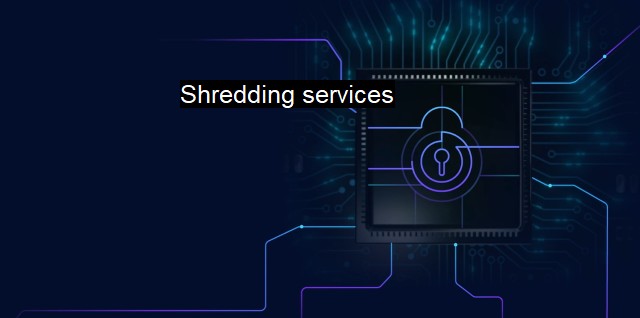What are Shredding services?
Protecting Sensitive Data: Understanding the Critical Role of Shredding Services in Cybersecurity and Data Protection Strategies
Shredding services are a critical part of cybersecurity management and data protection, particularly in an age defined by digital breaches and cyber threats. In both its physical and digital forms, shredding services concretely eliminate unwanted or outdated data, significantly reducing the risk of relevant information falling into the wrong hands.Traditionally, shredding services referred to the destruction of physical documents. Reliable shredding services offered secure ways to destroy sensitive physical paper records such as contracts, human resources files, and customer data, significantly reducing the risk of information theft.
The advent of information technology and evolution toward a digital economy have considerably broadened the concept of shredding. In this context, shredding extends beyond physical paper documents to encompass digital data files stored on electronic devices, such as hard drives, servers, desktop PCs, laptops, smartphones, and other portable storage devices. This extension is crucial as immense amounts of information today are housed digitally, making it a hotbed for cybercrime activities if not appropriately managed.
In the digital realm, shredding services involve the destruction of data to the point they're irrecoverable. This means that even someone using advanced data recovery tools will fail in retrieving the shredded files. Shredding services typically use multiple layers of data destruction processes, overwriting the data storage domains of a file with random binary data. As a result, the original file components are rendered irretrievable.
It is of escalating importance for businesses and individuals alike to adopt digital shredding services, particularly when retiring old storage devices. Physically destroying a device – say, an old hard drive, doesn't always make its data irretrievable. Specialty data recovery services can, more often than not, salvage information from a physically damaged device. Digital shredding adds a necessary layer of defense here, ensuring data is eradicated entirely and irrevocably before the associated hardware is discarded.
Beyond hardware retirement, shredding services also have a daily application in the disposal of regular digital files, akin to a digital incinerator. Even when files are "relocated" to the digital recycle bin, most remain largely intact on the device's hard drive – lying dormant but still recoverable. Digital shredding services directly address this residual data risk. They ensure that files, once disposed of, are permanently and irreversibly erased from the device.
Shredding services are integral to overall data hygiene practices. Proper data disposal should be embedded in an organization's Information Security Management System (ISMS) or an individual's device management habits. Many mature antivirus programs offer data shredding services, overwriting space once filled by deleted files and effectively making said data indecipherable and irrecoverable.
Shredding services perform an instrumental role in cybersecurity. They offer an effective method for securing data, both physically and digitally. With safeguards against the theft of disposed information and tightly woven into an all-encompassing cybersecurity and antivirus strategy, these services turn old, unwanted, or unnecessary files into scraps – beyond any measure of recognition or recovery. As our reliance on digital data grows and cyber threats evolve, so too must the robust data protection practices offered by reliable shredding services.

Shredding services FAQs
What is shredding in the context of cybersecurity and antivirus?
Shredding is a process of securely deleting digital data so that it cannot be recovered or accessed by unauthorized persons. In cybersecurity and antivirus, shredding is often used to permanently delete sensitive or confidential files to prevent data breaches or cyber-attacks.Why is shredding important in cybersecurity and antivirus?
Shredding is important in cybersecurity and antivirus to prevent sensitive or confidential data from falling into the wrong hands. Cybercriminals use various methods to retrieve deleted data and use it for malicious purposes. Shredding ensures that the data is permanently deleted and cannot be recovered, which reduces the risk of data breaches or cyber-attacks.What are the benefits of using shredding services in cybersecurity and antivirus?
Using shredding services in cybersecurity and antivirus has several benefits. It helps to protect sensitive or confidential data from being accessed by unauthorized persons, reduces the risk of data breaches, and helps to comply with regulations such as GDPR and HIPAA. Shredding services also save time and resources by securely deleting large amounts of data quickly and efficiently.How can I select the right shredding service for my cybersecurity and antivirus needs?
When selecting a shredding service for your cybersecurity and antivirus needs, it is important to consider factors such as the level of security offered, the reputation of the service provider, and the cost. Look for a service that offers advanced encryption and data destruction technologies, has a proven track record of providing secure data destruction, and offers competitive pricing. Also, check for certifications such as NAID or ISO 27001 that indicate the service provider follows industry standards and best practices for secure data destruction.| | A | | | B | | | C | | | D | | | E | | | F | | | G | | | H | | | I | | | J | | | K | | | L | | | M | |
| | N | | | O | | | P | | | Q | | | R | | | S | | | T | | | U | | | V | | | W | | | X | | | Y | | | Z | |
| | 1 | | | 2 | | | 3 | | | 4 | | | 7 | | | 8 | | |||||||